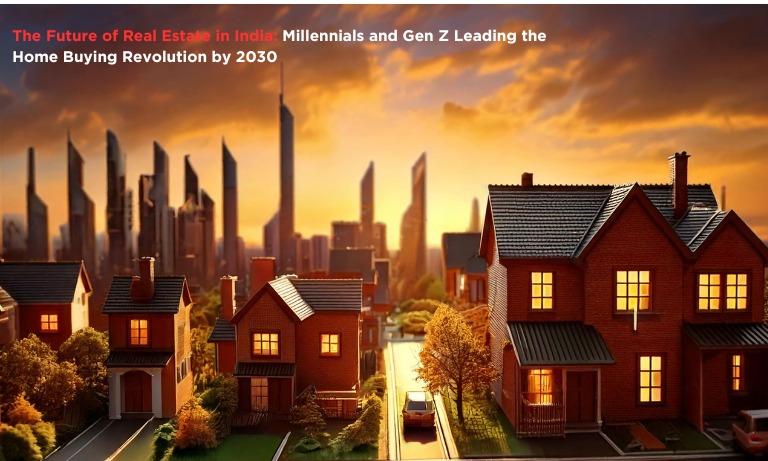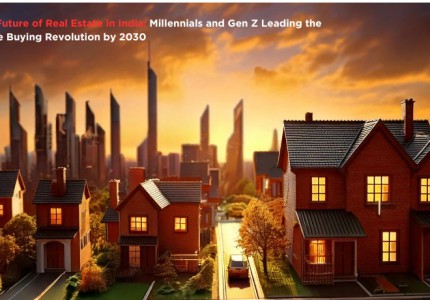The Future of Real Estate in India: Millennials and Gen Z Leading the Home Buying Revolution by 2030

A recent report by JLL reveals a transformative shift in India's real estate market, predicting that by 2030, around 60% of new home buyers will belong to the millennial and Gen Z demographics. This significant change underscores the growing purchasing power of younger generations and their evolving preferences when it comes to homeownership. This marks a crucial moment in the country’s housing landscape for developers, investors, and prospective homebuyers, as millennials and Gen Z become the driving force of real estate transactions.
A Shift in Demographics: The New Face of Homebuyers
The real estate market in India is undergoing a profound transformation. No longer dominated by older generations, the home buying landscape is now being shaped by millennials (born between 1981 and 1996) and Gen Z (born after 1996). This demographic shift is not just a passing trend; it signals the rise of a new class of homebuyers who are tech-savvy, environmentally conscious, and keen on making sustainable, long-term investments.
With 60% of new homebuyers expected to come from these younger generations by 2030, it’s clear that real estate developers and investors must adapt their strategies to cater to this new wave of homebuyers. Millennials and Gen Z are increasingly prioritizing factors such as sustainability, technology integration, and community-centric living environments, all of which are expected to be key trends in the housing market moving forward.
Economic Drivers: Rising Incomes and Improved Access to Financing
The increasing dominance of millennials and Gen Z in India’s housing market can be attributed to several economic factors. Rising incomes, greater job security, and access to innovative financing options have significantly improved the purchasing power of younger buyers. A growing middle class, combined with more affordable housing loans and government initiatives supporting first-time buyers, has made it easier for younger generations to take the plunge into homeownership.
These economic changes, along with the widespread availability of home loan schemes and low-interest rates, have created a favorable environment for millennials and Gen Z to purchase homes and properties. As these younger buyers achieve financial independence, they are increasingly drawn to the idea of investing in property as a means of securing their financial future.
Millennial and Gen Z Preferences: Sustainability and Smart Homes
Unlike previous generations, millennials and Gen Z are not only interested in owning a property—they are looking for homes that align with their values and lifestyle preferences. Sustainability is one of the most prominent factors driving their purchasing decisions. Energy-efficient homes, use of eco-friendly materials, and developments with green spaces are highly sought after. Many younger buyers are also keen on reducing their carbon footprint, making environmentally-conscious homes a top priority.
Moreover, the demand for smart homes is rapidly increasing. Young buyers want homes equipped with the latest technology, from smart security systems to automated lighting and energy management. As the internet of things (IoT) continues to evolve, the integration of these advanced technologies in residential properties will become a significant selling point.
Community-Oriented Living: The Rise of Social Spaces
In addition to individual preferences, millennials and Gen Z are placing a high value on community-oriented living spaces. They seek properties that offer a sense of belonging, social interaction, and shared experiences. Developments with communal amenities such as co-working spaces, fitness centers, social clubs, and recreational areas are becoming increasingly popular among these generations.
This shift towards community-focused living reflects a broader societal trend where young people are increasingly prioritizing work-life balance, social connections, and overall well-being. Real estate developers who understand these preferences and incorporate these features into their projects will be well-positioned to tap into this growing market.
A Bright Future for Real Estate Developers and Investors
The changing dynamics of the Indian real estate market present both challenges and opportunities. For developers, adapting to the preferences of millennials and Gen Z will be key to remaining competitive in an evolving market. By focusing on sustainability, integrating technology, and designing properties that foster community living, developers can attract a younger, more engaged buyer pool.
For investors, this shift presents a lucrative opportunity to capitalize on the growing demand for homes tailored to the needs of younger generations. Investing in projects that align with these trends will not only meet the needs of today’s homebuyers but also ensure long-term profitability as the market continues to grow.
As a prospective homebuyer, now is the perfect time to explore opportunities that align with your vision of the future. Whether you’re looking for an energy-efficient, smart home or a vibrant community with like-minded individuals, the future of real estate in India is full of possibilities. Don’t miss out on the chance to be part of this exciting transformation.
Conclusion: Make Your Move Today
The rise of millennials and Gen Z in the real estate market is reshaping the landscape of homeownership in India. With increasing purchasing power, a focus on sustainability, and a demand for community-oriented living spaces, this demographic shift offers significant opportunities for developers, investors, and homebuyers alike. As we approach 2030, now is the perfect time to explore the real estate market and secure your dream home or investment property.
If you’re ready to invest in the future of real estate, contact us today and take the first step toward owning a property that reflects your values, lifestyle, and aspirations.
